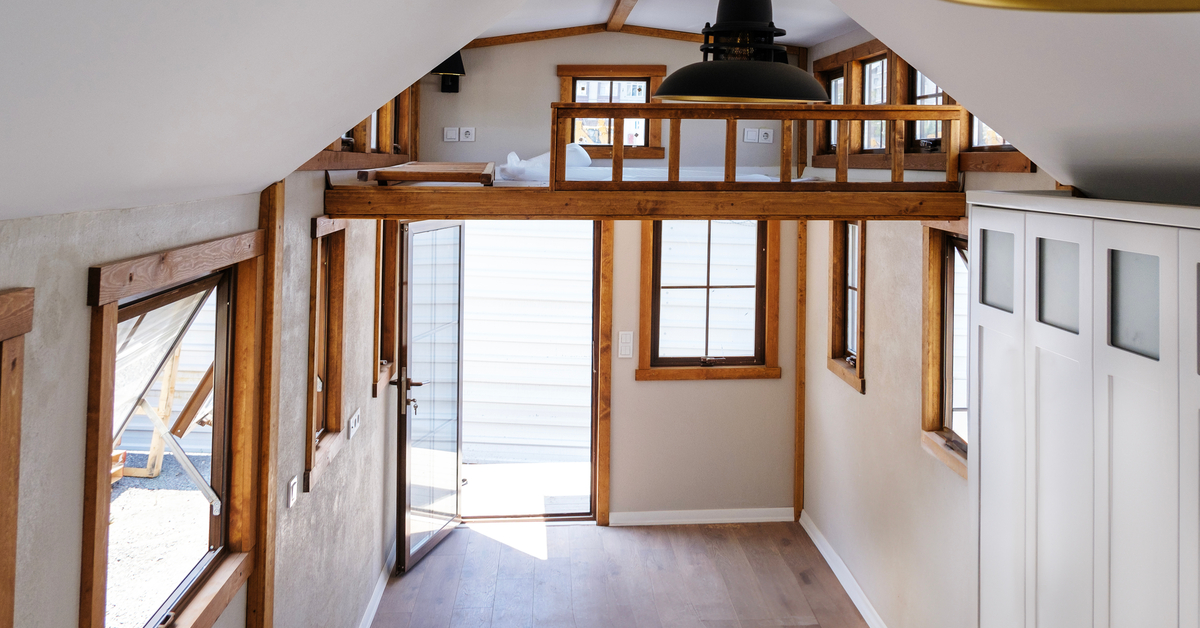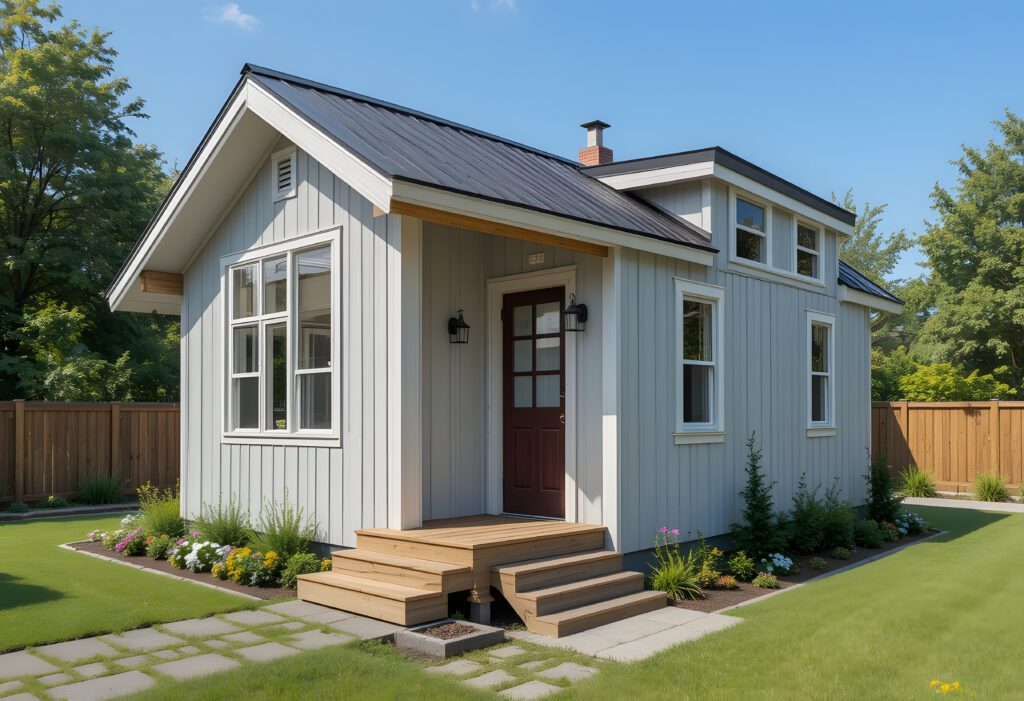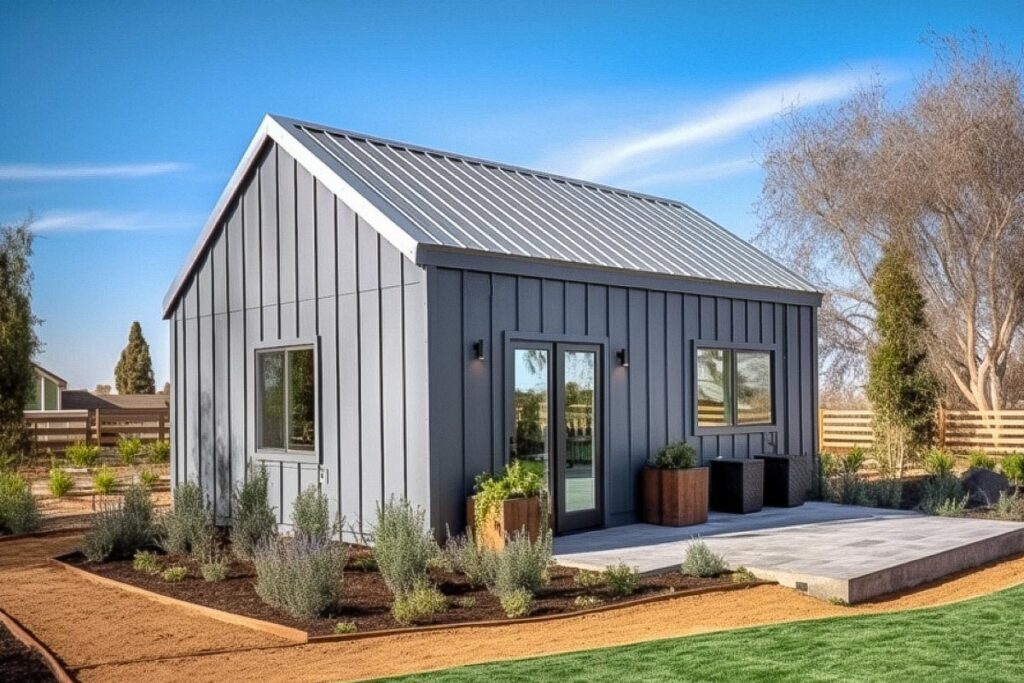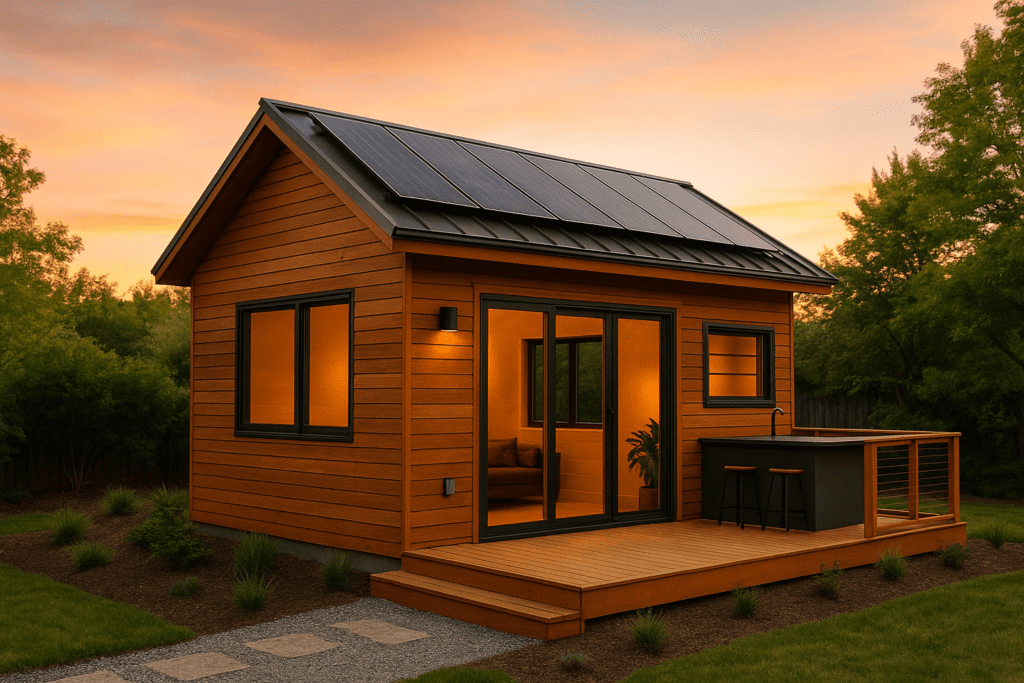Let’s be real. Anyone can weld a frame together and call it a tiny house trailer. That doesn’t mean it’s safe. Or smart. Or built to last past a couple of road trips and one rough winter.
If you’re shopping for a tiny house for sale, or looking to build one from scratch, the trailer underneath it matters more than most people realize. It’s not the “fun” part of the build, sure. But it’s the part that decides whether your tiny house holds up… or quietly starts falling apart.
And that’s exactly where experienced tiny house trailer manufacturers separate themselves from the rest of the pack.
This isn’t about shiny marketing or big promises. It’s about engineering, load ratings, weld quality, real materials, and builders who’ve already made the mistakes so you don’t have to.
Let’s break down what actually makes a manufacturer worth trusting.
Why the Trailer Is the Backbone of Any Tiny House
People fall in love with the windows. The layout. The porch. The loft ladder. Nobody gets excited about steel thickness.
But the truth is simple. Your trailer is the foundation. And if the foundation is wrong, everything above it is fighting a losing battle.
A weak trailer causes:
- Frame flex that cracks drywall
- Doors that stop closing right
- Windows that leak
- Rooflines that shift
- Axles that fail early
- Tires that wear unevenly
And the scary part? Most of that damage doesn’t show up right away. It sneaks in slowly. By the time you see it, repairs cost real money.
Experienced tiny house trailer manufacturers design around load distribution, tongue weight, torsional stress, and braking capacity. New or cheap builders often… guess.
That difference shows up after mile 300, not mile three.
What Experience Actually Means in This Industry
“Experience” gets thrown around a lot. But in the trailer world, it has a very specific meaning.
It means they’ve:
- Built hundreds (or thousands) of frames
- Seen real trailer failures
- Had customers come back with feedback
- Adjusted designs based on real-world stress
- Refined weld patterns over time
- Upgraded materials when older ones didn’t perform
That kind of experience doesn’t come from YouTube tutorials. It comes from years on the shop floor.
This is exactly why companies like Trailer Made Custom Trailers stand out. They’re not guessing what works. They’re building from hard-earned data.
Engineered Trailers vs “Shop-Built Frames” (Huge Difference)
Here’s a hard truth that makes some builders uncomfortable.
Not all trailers are engineered. Many are just shop-built frames with a VIN welded on.
An engineered trailer is drawn, analyzed, and tested before it’s ever built. The load ratings are verified. The axle placement is calculated. The steel thickness is selected based on real forces, not opinion.
Shop-built frames? They’re built on “what worked last time.” That’s not engineering. That’s hope.
When you’re talking about a 14,000–20,000 lb rolling house, hope is not a strategy.
Experienced tiny house trailer manufacturers work with engineers. Period. That’s how braking, axle spread, weight distribution, and frame strength all get dialed in correctly.
Cut corners here, and the only thing you’re cutting is the life of your home.
Load Ratings Aren’t Just Numbers on Paper
A trailer rated for 14K doesn’t magically become safe at 13,900 lbs. Real-world loads shift. Water tanks slosh. Appliances vibrate. People move.
Good manufacturers build in a safety buffer. Cheap ones build right to the edge.
If you’re buying a tiny house for sale, always ask:
- What’s the total weight of the house?
- What’s the net load rating of the trailer?
- Is that rating verified by engineered axles and frame specs?
If the seller can’t answer cleanly, that’s your red flag.
Why Axle Placement Is a Bigger Deal Than Most People Think
This one’s sneaky.
Axles that are even slightly off create:
- Dangerous tongue weight
- Poor towing behavior
- Increased sway at highway speeds
- Premature tire wear
- Frame stress at the wrong points
Experienced manufacturers don’t eyeball axle placement. They calculate it based on projected live load, water placement, loft weight, appliance locations, and hitch configuration.
That math matters. A lot.
Weld Quality Is Everything (But Almost Nobody Talks About It)
Bad welds don’t usually fail instantly. They fatigue. Slowly. Over time.
Micro-cracks form. Stress concentrates. And one day, a joint fails that was never supposed to.
The best tiny house trailer manufacturers use certified welders, full penetration welds, and consistent inspection protocols. That’s not cheap. And it shouldn’t be.
Because rewelding a loaded frame after the house is finished is a nightmare, trust me.
Why Cutting Corners on Trailers Is Always a Bad Deal
Let’s be blunt.
Saving $1,500 on your trailer can cost you $15,000 later.
Cheap trailers usually cut costs by:
- Using thinner steel
- Skipping reinforcement
- Using lower-grade axles
- Rushing welding
- Avoiding engineered designs
- Applying cheap coatings that rust fast
Those savings vanish the moment something shifts, cracks, or breaks.
A trailer should last longer than the house built on it. That’s the goal. Anything less is settling.
Tiny House Trailers vs Utility Trailers (Not the Same Animal)
This mistake still happens way too often.
Someone buys a beefed-up utility trailer thinking it’ll handle a tiny house. Sometimes it works. Often it doesn’t.
Utility trailers are designed for:
- Temporary loads
- Even weight distribution
- Short travel distances
- Open-air decks
Tiny houses are:
- Permanent loads
- Asymmetrical
- Tall and wind-sensitive
- Moved infrequently but under huge stress
Different job. Different build.
Real tiny house trailer manufacturers design specifically for living structures. Not landscaping equipment.
How Trailer Made Custom Trailers Approaches This Differently
This is where Trailer Made Custom Trailers earns its reputation.
They specialize in:
- Engineered tiny house trailers
- ADU trailers
- Park model foundations
- Custom heavy-duty builds
Every design considers:
- Actual load requirements
- Road stress
- Long-term flex
- Proper braking
- Towing stability
- Steel longevity
They’re not building “close enough.” They’re building it right the first time. That’s the difference.
ADUs, Tiny Homes, and the Crossover Market
More buyers today are searching for:
- An ADU for sale
- Mobile backyard dwellings
- Rental tiny homes
- Guest houses on wheels
That crossover market creates new demands on trailers.
An ADU trailer often:
- Moves once or twice, then sits for years
- Carries higher interior loads
- Needs long-term leveling stability
- Must handle utility hookups better
Not every trailer is built for that kind of lifecycle. Experienced manufacturers design for both mobility and long-term static load.
That balance matters more than people think.
Custom vs Mass-Produced Trailers
Mass production keeps prices down. No doubt. But it also forces one-size-fits-all specs.
Custom manufacturing allows:
- Adjusted axle spreads
- Reinforced loft zones
- Custom frame widths
- Tank-support integration
- Specialized hitch setups
If you’re building a unique layout or something oversized, custom matters. A lot.
That’s exactly where Trailer Made’s custom approach shines.
What Buyers Should Ask Before Choosing a Trailer Manufacturer
If you’re serious about buying a tiny house for sale, or working with a builder, ask these uncomfortable questions:
- Is this trailer engineered?
- What steel thickness is used?
- What axles are installed and what are they rated for?
- How is corrosion protection handled?
- Where are the high-stress reinforcement zones?
- Who built the trailer, and how long have they been doing this?
Good manufacturers answer straight. Weak ones dodge.
Long-Term Value Is Built Under the Floor
Here’s the part nobody puts on Instagram.
A strong trailer:
- Keeps resale value high
- Minimizes maintenance
- Prevents foundation rebuilds
- Protects interior finishes
- Improves towing safety
- Reduces insurance headaches
It doesn’t show off well in photos. But it protects everything that does.
That’s real value.
Why Trailer Manufacturing Affects Your Insurance and Financing
Insurance companies care about:
- VIN documentation
- Axle ratings
- Brake systems
- Structural integrity
Financing institutions care about:
- Recognized manufacturers
- Engineered compliance
- Long-term asset stability
Experienced tiny house trailer manufacturers make both of those processes smoother. Backyard builds? Not so much.
The Growing Market and the Growing Gap in Quality
The tiny house industry exploded fast. And whenever that happens, quality gaps appear.
Some manufacturers grew with the industry. Others rushed in for quick profit.
Buyers now face two very different markets:
- Built-to-last trailers
- Built-to-sell-fast trailers
They don’t look that different online. But on the road? Night and day.
What Happens When You Try to “Upgrade Later”
This is another common trap.
People buy a cheap trailer thinking they’ll reinforce it later if needed. That rarely works the way they expect.
Once the house is built:
- You can’t easily access key weld zones
- Frame modifications get expensive
- Load redistribution becomes risky
- Retrofitting axles costs a fortune
Upgrading later usually costs more than building right up front.
The Real Cost of Stability
Stability isn’t flashy. But it lets you:
- Drive at highway speed without sway
- Park long-term without frame settling
- Stack lofts without stress cracks
- Add solar without a frame flex
- Carry full water tanks safely
That stability starts with experienced manufacturing.
Why Trailer Made Has Earned Industry Trust
Trust in this industry is built slowly. One trailer at a time.
Trailer Made Custom Trailers has earned it through:
- Consistent engineering
- High-grade materials
- Real-world testing
- Custom builds done right
- Long-term client performance
That’s how reputations survive in a market full of shortcuts.
If You’re Buying a Tiny House for Sale, Don’t Skip the Trailer Question
A pretty interior doesn’t protect your investment if the trailer underneath it can’t handle the job.
Ask who built it. Ask how it was built. Ask whether it was engineered. If the seller can’t tell you, that’s your answer.
Final Words
Let’s wrap this up clean.
You can remodel a kitchen. You can replace siding. You can swap flooring.
You can’t easily replace a bad trailer.
That’s why working with truly experienced tiny house trailer manufacturers matters more than any design choice.
It’s why brands like Trailer Made Custom Trailers lead this industry instead of chasing it.
And it’s why cutting corners at the foundation level almost always comes back to haunt the owner later.
If you’re serious about your build, your ADU investment, or a long-term tiny house for sale, start where the real strength lives.
Visit Trailer Made to start building the right way.
FAQs
1. Why does the trailer matter so much for a tiny house for sale?
Because it carries the entire structure, a weak trailer causes long-term structural problems, unsafe towing, and expensive repairs, the trailer isn’t optional. It’s the foundation.
2. What makes experienced tiny house trailer manufacturers better than new builders?
Experience means real-world testing, refined designs, engineered specs, better weld quality, and fewer failures. New builders often learn through costly mistakes.
3. Can I use a regular utility trailer for a tiny house?
Short answer? You shouldn’t. Utility trailers aren’t designed for permanent structural loads, tall profiles, or long-term static weight. Tiny house-specific trailers are built completely differently.
4. Is buying a custom trailer better than buying a standard model?
For unique layouts, heavy builds, or ADU use, yes. Custom trailers allow proper axle placement, reinforcement, and design adjustments that mass-produced frames can’t match.
5. Where can I get a professionally engineered tiny house trailer?
Trailer Made Custom Trailers specializes in engineered tiny house and ADU trailers built for long-term performance. You can start your build at Trailer Made Trailers.













